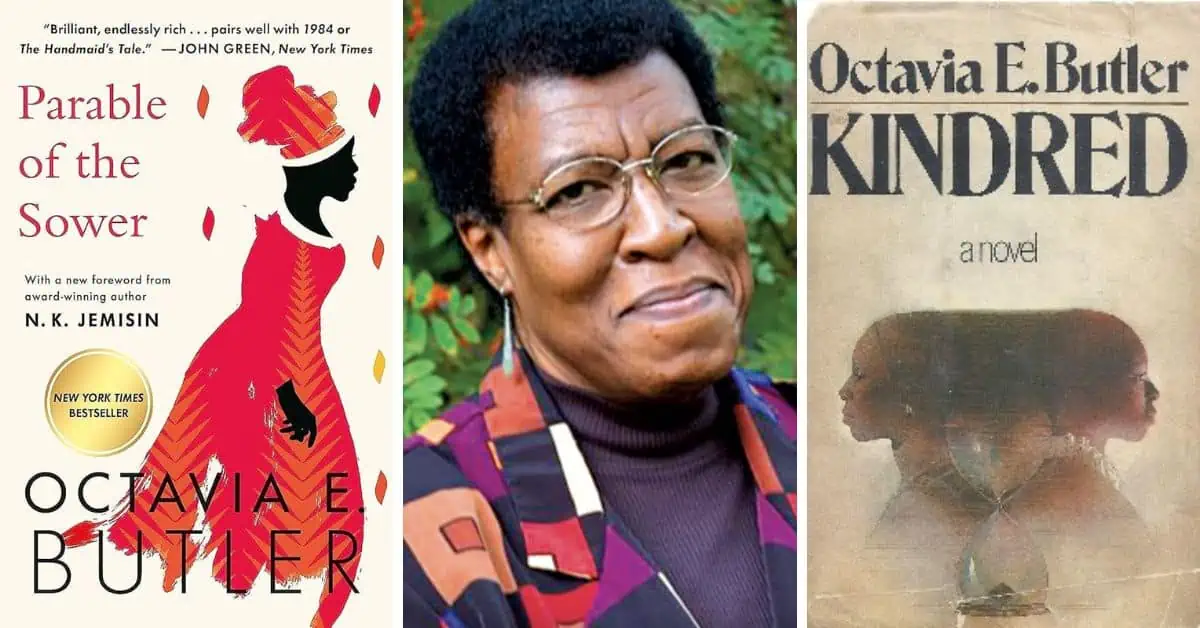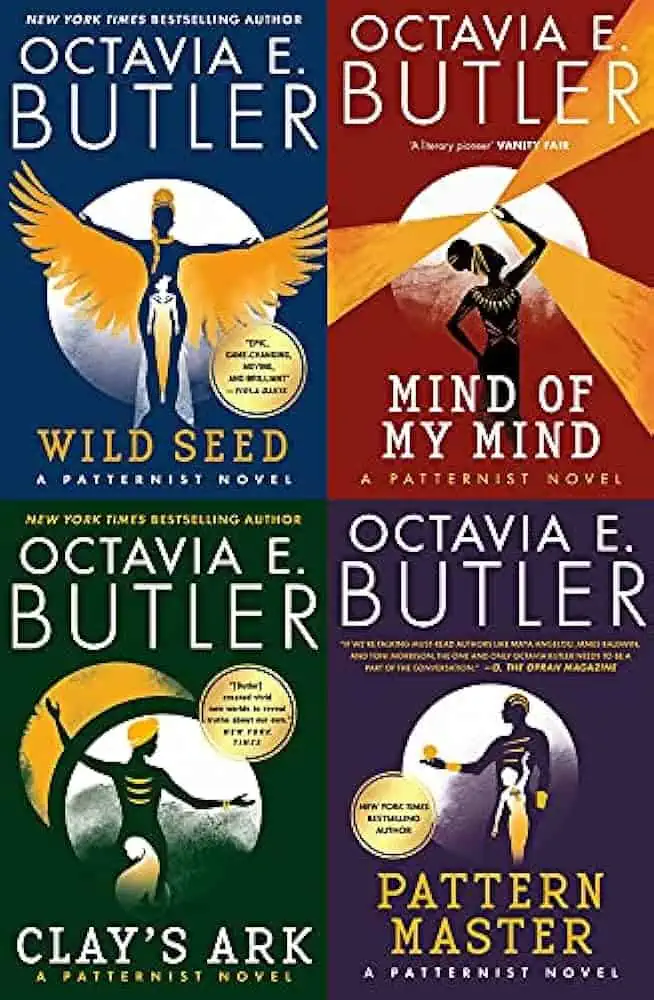INTJ Author Spotlight: Octavia Butler
Octavia Butler has long been a hero of mine. As a huge fan of The Parable of the Sower, I found her writing deeply moving and her insights into possible futures both uncanny and profound. She had a mind that churned out groundbreaking science fiction in a predominantly white, male-dominated era. Her novel, The Parable of the Sower, explored themes of survival, community, and empathy in a world far removed from our current day.
But Octavia Butler wasn’t a wealthy author who lived the high life and had everything handed to her. Behind her vividly crafted stories was an introspective and often lonely person. She often felt misunderstood, misjudged, and unheard. But regardless of the difficulties she faced, she still continued to try. Persistence, vision, and conviction were core themes of her life, and I believe these same themes had a lot to do with how incredible her legacy really is. As I researched her life I felt moved to tears by the struggles she faced, the inner turmoil she dealt with, and the inner drive that pushed her to keep writing even when it felt impossible.

Table of contents
Estimated reading time: 1 minute
A Look at Octavia Butler’s Life
Octavia Estelle Butler was born on June 22, 1947, in Pasadena, California. She was brought up by her mother, Octavia M. Butler, a housemaid, and her grandmother. From a very young age, Butler struggled with dyslexia, but this did not deter her passion for reading and writing. As a child, Butler found solace in the local library, immersing herself in science fiction tales that would seed her lifelong journey of storytelling.
Butler’s introverted nature and towering height often made her the object of schoolyard taunts, an experience that later became the bedrock for many of her fictional characters who were outsiders or “the other” in society. These early experiences would flavor her writing with deep empathy for characters on the fringes of society, struggling against the status quo.
Despite financial constraints and the pressing need to work a series of menial jobs, Butler pursued her education at Pasadena City College, where she earned an Associate of Arts degree with a focus on History. Eventually she was led to the Writers’ Workshop at California State University, Los Angeles, where she further honed her craft.

Inspired to make a difference through Science Fiction, a genre dominated by white men at the time, Butler’s breakout in the 1970s marked the introduction of the Patternist series. This series showcased creative storytelling around psychic control, immortality, and human metamorphosis. Her protagonists, individuals with extraordinary mental abilities, navigated a world structured by telepathic powers. Later, works like Kindred (1979), Dawn (1987), and Parable of the Sower (1993) elevated her status, expanding science fiction’s boundaries with insightful explorations of race, gender, and humanity. Despite facing racism and sexism, Butler’s perseverance earned her a MacArthur Fellowship in 1995, granting her the freedom to focus on writing.
The literary world was shocked and saddened by the premature death of Octavia Butler on February 24, 2006, at the age of 58. She passed away after suffering a fall outside her home in Lake Forest Park, Washington, a tragic and unexpected end for a pioneering figure in literature. Her death marked the loss of a powerful voice in science fiction, a genre she enriched with her unique perspective and relentless imagination. Butler’s untimely departure left her many fans and followers mourning not only the person but also the stories and insights that might have been.
But Why Do I Think Octavia Butler Was an INTJ?
Let’s start with the basics. First off, Butler referred to herself as an introvert and so did those who were close with her. On top of that, she focused much more on concepts, imagination, and theoretical possibilities than on the tried-and-true or the details of real, current life. This solidifies her as an Intuitive type. Thinking and Feeling were the hardest preferences to determine; she clearly had the convictions and inner-value orientation of an Introverted Feeling type, but the structured, methodical approach of an Extraverted Thinking type. The more I researched her, the more I felt like the two worked together, but that Thinking was more natural, particularly in her relationships with others. On top of that, her structured, persistent, goal-focused approach seemed more aligned with a J preference than a P preference.
The Private World of Octavia Butler
Octavia Butler was known for her introspection, preference for solitude, and persistence in chasing after her goals. These qualities are all aligned with the INTJ personality type. INTJs, often called “Strategists” believe in chasing their vision with single-minded purpose, quietly pursuing their biggest dreams, and working hard and consistently towards their goals.
“I’m comfortably asocial—a hermit in the middle of Los Angeles—a pessimist if I’m not careful, a feminist, a Black, a former Baptist, an oil-and-water combination of ambition, laziness, insecurity, certainty, and drive.”
Her self-described “comfortably asocial” description probably feels relatable to many INTJs reading this. It was in her journals that Butler’s real thoughts and feelings thrived; yet on the outside, she often remained quiet and unreadable.
Butler’s affinity for being a “hermit” aligns with the INTJ’s natural preference for inner contemplation; turning away from the noise in favor of sifting through complex ideas and hatching plans for her creative works. This introspective solitude was not a barrier, but a gateway to rich inner worlds she crafted in her writing. She often wandered through her room, surrounded by dozens of open books, connecting ideas and looking for insights that would hit her out of nowhere. This ability to synthesize many disparate ideas into one theme or vision is a sign of Introverted Intuition, the INTJ’s dominant function.
The Visionary Craft of a Writer
Butler was undeniably a dreamer and a visionary—infinite worlds and possibilities sprouted from the fertile soil of her mind. Musing on her creative process, she said:
“The world is full of painful stories. Sometimes it seems as though there aren’t any other kind, and yet I found myself thinking how beautiful that glint of water was through the trees.”
Her intuitiveness, her calling to see beyond the concrete and to create new worlds, allowed her to explore the human condition within her narratives. She was a master of blending reality with speculative imaginings. Butler, like many INTJs, had a natural inclination toward future thinking and the anticipation of what could be, rather than what was.
Method in Her Routine
The structure and tenacity of Butler’s work ethic aligns with the INTJ’s natural love of structure, consistency, and planning. Butler was nothing if not consistent and persistent.
“First forget inspiration. Habit is more dependable. Habit will sustain you whether you’re inspired or not.”
She identified habit as the true driver of success, and I believe many INTJs (myself included) would agree with her. The ability to push past the noise, the feelings, the need for inspiration, and consistently put in the hard work is something that TJ personality types are famous for.
As an example of this, every morning Butler would write in her journals her long-term goals. They started with “Have $100,000 in my savings account” and eventually led to “Have $1,000,000 in my savings account”. The course was not easy; nothing came quickly. Most of her earnings she used to support her mother and pay off her mother’s home. She took her responsibility as a daughter very seriously. In her journals she often recalled her mothers hardships; how in her childhood she saw her mother being disrespected and demeaned by the very people whose homes she cleaned. Butler couldn’t help but dream of the day when she could reduce the financial load her mother faced.
Ever The Perfectionist
INTJs are nothing if not perfectionists, and Octavia Butler struggled with this as well. She kept hoping that she would write something “perfect”, something that would finally be accepted by the masses. She dealt with this perfectionism by embracing persistence rather than giving up:
“You don’t start out writing good stuff. You start out writing crap and thinking it’s good stuff, and then gradually you get better at it. That’s why I say one of the most valuable traits is persistence.”
True to the INTJ personality, Butler did not shy away from criticizing her early work, instead taking a critical and objective view of her writing progression. INTJs are known for setting lofty standards, both for themselves and their projects. Butler’s growth as a writer paints a picture of an individual continually refining her craft in pursuit of an ideal.
The Ethics of Inner Values
INTJs are thinkers, of course, but they also have a deeper core that is focused on values and questions of right and wrong. Many INTJs are deeply principled, guided by an inner compass of beliefs and conscience-centered ideals. Butler’s moral convictions shone through her writing and her life choices, as she openly grappled with ethical dilemmas and her own conscience:
“I have a huge and savage conscience that won’t let me get away with things.”
“I’m trying to speak–to write-the truth. I”m trying to be clear. I’m not interested in being fancy, or even original. Clarity and truth will be plenty, if I can only achieve them.”
This moral fierce independence reflects the strength of the INTJ’s introverted feeling function (Fi), which acts as a filter through which everything must pass. Butler’s commitment to exploring ethical and social issues in her stories echoes the INTJ’s drive to align their external world with their strong internal values.
A Journey Outside the Norm
INTJs are typically nonconformists. They often reject societal norms in favor of their internally-driven directions—Butler was no exception. Her exploration of unconventional and far-flung territories in her writing reflects the INTJ’s penchant for breaking molds:
“I was attracted to science fiction because it was so wide open. I was able to do anything and there were no walls to hem you in and there was no human condition that you were stopped from examining.”
Her pursuit of science fiction as a vehicle to question and scrutinize the status quo is emblematic of the INTJ’s inherent need to explore and reform existing systems.
In Summary: The Architect of Stories
Octavia Butler, both in her process and personal philosophy, demonstrates qualities that characterize the INTJ personality type. From her intuitive, world-building approach to writing to her persistent, analytical mindset, Butler’s life reflects the INTJ’s vision and conviction. If you’re an INTJ you can use her writing and life as an inspiration to pursue your creative endeavors! Let me know if this story inspires you, or if you have any thoughts in the comments!
Sources:
The Spectacular Life of Octavia E. Butler
Subscribe to Our Newsletter

Want to discover more about personality type? Get the inside scoop with Susan Storm on all things typological, along with special subscriber freebies, and discounts on new eBooks and courses! Join our newsletter today!













Thanks for the excellent write-up! It’s great to read about a female INTJ writer that’s not… that other female INTJ writer. What did you think about the protagonist of The Parable of the Sower? I thought she seemed like an INFJ.